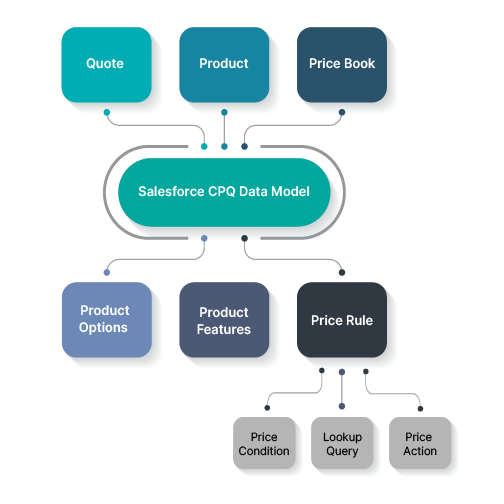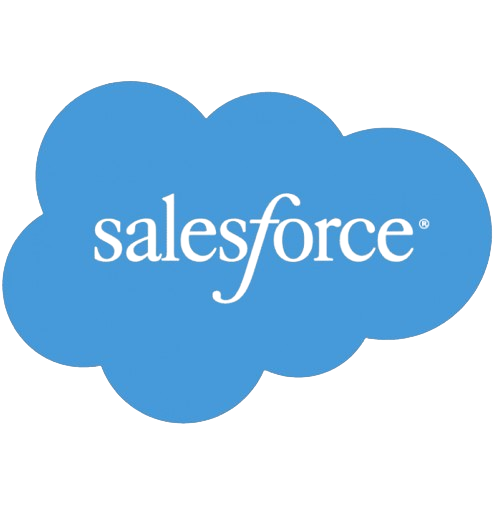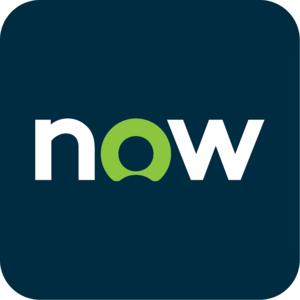Salesforce CPQ Data Model Explained – A Complete Guide
Are you burnt out from listing tons of client requirements and need a solution for all the grunt work? Lucky for you, there is a fix to all your problems. With Salesforce CPQ, you can streamline and automate the entire quotation process. Coupled with hiring a top-notch consulting agency, you’ll be able to boost your productivity tenfold. However, the Salesforce CPQ Data Model can get quite confusing. So, let’s break it down.
What is Salesforce CPQ?
Within Salesforce CPQ, the acronym stands for Configure, Price, and Quote. This robust automation tool elevates pricing models, ensuring precise client quotations, even when dealing with complex product intricacies. Its advantages go beyond merely streamlining workflows; it also enforces a uniform pricing strategy across all channels, significantly reducing the likelihood of human errors. Moreover, it enables seamless integration of CPQ applications with other Salesforce products, such as CRM systems, providing a comprehensive solution to fulfill all of a company’s needs.
It takes non-CPQ users 73% more time to produce a typical quote or proposal.
The Salesforce CPQ Data Model

The Salesforce CPQ Data Model is a relational database that helps companies store various information in the form of a table. This is unique because it is explicitly targeted to the sales department, making it easier for them to use it to streamline their workflow. There are a couple of main objects in this data model:
Quote
This refers to a single quote generated for a particular customer. It contains information about the pricing models being used the products that are being quoted, along with the option to customize specific fields your company might need. A quote can have several line items that have to be entered as Products.
Product
This contains all information about the service or product your company is selling. Information like description, name, and customer fields are present here. It also includes prices of what is being sold, logged in the Price Book.
Price Book
This contains two iterations: the standard price book and the custom price book. The standard price book contains your company’s default prices, while the custom price book contains special prices you offer to particular clients. The custom table helps when you want to view your pricing strategy for a specific market segment or region. Both of them also contain the products and services to connect the objects.
Product Options
This contains information about products that can be grouped and sold to the client in a package.
Product Feature
Product Features, nestled within a bundle, serve as categories. Bundles can exhibit various Product Features, ranging from multiple to none, and each feature may accommodate multiple Product Options.
Price Rule
An essential feature in the Salesforce CPQ Data Model is their “Price Rule” which helps define a set of rules for product and pricing. Triggers allow a specific action to be executed based on some conditions. For example, each client can be given an exact discounted price based on requirements set by the company. You can set as many conditions as you want to trigger the necessary action to occur. Price Rules can be further classified into three objects:
- Price Condition: This component establishes the condition that acts as the catalyst for activating the price rule.
- Lookup Query: This feature facilitates mapping records on the Quote Line to the documents within the object specified in the Lookup Object field. It searches for a matching record with identical values, extracting a related field value from the identified form.
- Price Action: This dictates the action to be executed on the field of the target object, provided that the predefined conditions have been met.
Why Should You Choose the Salesforce CPQ Data Model?
Using this Database has several perks:
- When using the CPQ Data Model, you will have greater transparency into your services and products. Knowing which products are doing well and which ones need further improvements can help identify problems, thereby improving sales.
- A streamlined workflow allows for increased productivity and improved efficiency. By automating the sales process, you can give more accurate quotes, which helps close deals much faster.
- Customer satisfaction is essential for any organization. With the Salesforce CPQ Data Model, you can ensure that the information going to the client is accurate. This increases your credibility, ensuring your clients happiness.
- The Salesforce Data Model is the best choice for your growing business. This is because the model is highly scalable, accommodating the growth of your business and the complexity of your product catalog.
- Flexibility is an essential factor when it comes to databases. CPQ allows you to customize your pricing rules and conditions to suit your unique business needs. You can tailor the system to match your specific product offerings.
Conclusion
When deciding which database is ideal for you, it is essential to look at all its features holistically. Based on your particular needs evaluating its tools and features will help you decide which is the best fit for your specific needs. The Salesforce CPQ Data Model offers ease of access and accommodates scalability and flexibility, which are essential for any organization. If you need help with your Salesforce CPQ Implementation and its best practices, contact our team for tailored solutions to your CPQ problems.






